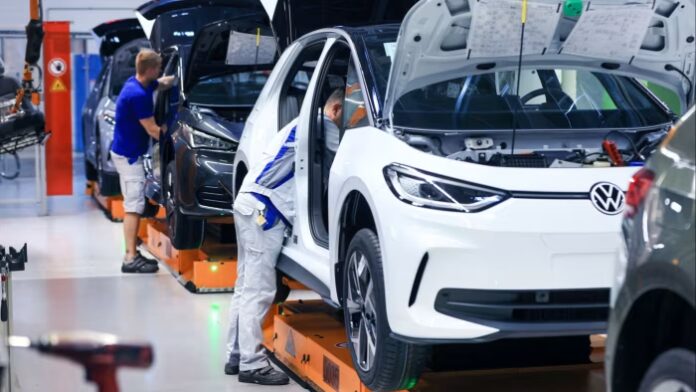European carmakers are deploying their “Covid playbook” as they prepare for a fierce battle over automotive chip supplies after the Dutch government seized control of Chinese-owned chipmaker Nexperia.
Carmakers and their suppliers are mapping out their exposure to Nexperia after Beijing moved to cut off its outbound shipments following the diplomatic tussle over a company the Dutch government has decided is crucial to Europe’s economic security.
Nexperia makes basic low-margin chips that are widely used in electronic systems in cars and control everything from lighting and airbag systems to locks and windows. It was sold to a Chinese consortium in 2017 before being bought by Chinese group Wingtech.
The European Automobile Manufacturers’ Association (Acea), an industry body, has warned that stocks of Nexperia chips will run out in a few weeks. “It’s going to be a war between carmakers,” said one person at a European manufacturer.
“We’ve gone into 2021 mode”, when the semiconductor crisis occurred, said another person at a European automotive supplier.
“If you turn off a tap, the pipe will empty but you don’t know at what speed. Will the tap be reopened before the water runs out? That’s why we need to quickly solve this problem,” the person added.
The automotive industry is calling on governments on both sides to step in to resolve the issue. “We suddenly find ourselves in this alarming situation. We really need quick and pragmatic solutions from all countries involved,” said Sigrid de Vries, Acea’s director-general.
Andrew Bergbaum, global co-leader of the automotive and industrial practice at AlixPartners, said carmakers had brought back their pandemic-era “chips war rooms”. Some automotive suppliers said they held daily calls between logistics teams to identify the biggest gaps in supplies.
In the wake of the chip crisis, companies have diversified their supply chains and are far better equipped to know which components can be replaced, but vulnerabilities remain. Some components that Nexperia makes, for example, are available immediately, while others may take several months to produce, according to industry officials.
“I think the disruption has the ability to be really quite substantial,” Bergbaum said.
UBS analyst Patrick Hummel also said any escalation in the dispute “would affect the entire industry, as it could lead to widespread production halts at original equipment manufacturer and supplier level”.
Volkswagen has set up a task force to deal with the situation, although it said production was “unaffected”. Stellantis and BMW said they were both working with suppliers to assess the potential supply risks.
Bosch said it was in touch with Nexperia, which makes its electronic components, as well as with other suppliers and customers: “We continuously monitor market developments and adapt to changing situations.”
Jeremie Bouchaud, executive director at S&P Global Mobility, said Nexperia accounts for 5 per cent of a basic but crucial part of the global automotive chip market.
The company’s components can also be made by rivals including Infineon and STMicroelectronics, but he said a shortage of Nexperia chips could affect the rollout of major products by German carmakers such as BMW, Mercedes-Benz and Volkswagen. US rivals are likely to have started looking for alternative suppliers earlier this year.
“The scale of Nexperia’s presence across vehicle systems means no [carmaker] can claim complete insulation,” Bouchaud said, as every car has hundreds of such components.
Wingtech’s Chinese executives indicated in a recent investor briefing that Beijing had moved to cut off Nexperia’s outbound shipments to gain leverage in the continuing diplomatic tussle.
While the Dutch company makes semiconductor wafers in Germany and the UK, the chips are sent on to China for packaging and testing, where 80 per cent of its final products are processed.
“Under the current export controls, the vast majority of our products will remain within China,” Wingtech chair Yang Mu told investors.
China’s commerce ministry said on Thursday that it had no information when asked about its order blocking Nexperia’s exports from the country.
Spokesperson He Yongqian blamed the stand-off on pressure from Washington, including a new US affiliates rule that extends its sanctions to the subsidiaries of blacklisted companies, entangling Nexperia because of its Chinese parent Wingtech.
“It is hoped that the Dutch side will act independently and autonomously,” said He.
According to court filings, the Dutch government took management control of Nexperia after Washington warned that the company would not be removed from its export control list if its Chinese chief executive remained in charge.
The Dutch economy ministry this month removed Zhang Xuezheng, who is also Nexperia’s largest shareholder. It cited “serious governance shortcomings” when it announced its move on Sunday.
“The Dutch government continues to engage with the Chinese authorities to reach a constructive solution in the interest of Nexperia’s continuity,” a spokesman said.
Additional reporting by Sebastien Ash in Frankfurt and Andy Bounds in Brussels
Source link






